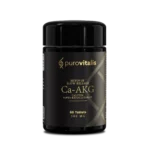
In questo articolo:
Introduzione | Cos'è il Ca-AKG | Benefici del Ca-AKG | Calcio AKG e longevità | Modalità di assunzione e dosaggio | Effetti collaterali e sicurezza | Fonti naturali e alimentari | Conclusione
Introduzione
Il calcio alfa-chetoglutarato (Ca-AKG) è un composto che ha suscitato un notevole interesse nella comunità della salute e del benessere per i suoi molteplici benefici. Come attore cruciale del ciclo di Krebs, noto anche come ciclo dell'acido citrico, il Ca-AKG è fondamentale per la produzione di energia a livello cellulare. Il suo ruolo va oltre la semplice produzione di energia, influenzando aree come la longevità, la salute dei capelli e la densità ossea. Questo ha portato alla sua crescente popolarità come integratore alimentare, con molti che cercano di sfruttare il suo potenziale per migliorare il loro benessere generale.
Che cos'è il Ca-AKG?
Il calcio alfa-chetoglutarato (Ca-AKG) è una forma di sale dell'acido alfa-chetoglutarico, un acido organico chiave coinvolto nel ciclo di Krebs. Questo percorso metabolico è essenziale per la produzione di energia, in quanto è responsabile della conversione dei nutrienti in ATP (adenosina trifosfato), la moneta energetica delle cellule. Il Ca-AKG svolge un ruolo fondamentale in questo processo, facilitando il trasferimento efficiente di energia e contribuendo alla salute cellulare complessiva.
Prodotto naturalmente all'interno dell'organismo e disponibile come integratore alimentare, l'importanza del Ca-AKG va oltre il metabolismo energetico. Agisce come un importante attore molecolare in vari processi fisiologici, tra cui la sintesi degli aminoacidi e il trasporto dell'azoto. La sua forma integrativa è spesso ricercata per i suoi presunti benefici per la salute, che vanno dalla maggiore longevità al miglioramento delle prestazioni fisiche.
Correlato: Che cos'è l'NMN: benefici, dosaggio e altro ancora
Benefici di Ca-AKG
Ca-AKG è un integratore con potenziali benefici per le ossa, l'energia, la pelle e i muscoli. Le prove provengono da studi sia sull'uomo che sugli animali. Sebbene sia promettente per migliorare la salute in diverse aree, la scienza è ancora in evoluzione. La ricerca sugli animali ha gettato una buona base, ma sono necessari altri studi sull'uomo per comprendere appieno il funzionamento del Ca-AKG e i suoi benefici. Questo breve sguardo al Ca-AKG evidenzia l'importanza della ricerca continua per confermare la sua efficacia e la sua sicurezza per l'uso a lungo termine.
Sostenere la salute delle ossa
Ca-AKG svolge un ruolo chiave nel mantenere le nostre ossa forti e sane, perché aiuta il nostro corpo a utilizzare il calcio in modo più efficace. Il calcio è un minerale vitale per la forza delle ossa e il Ca-AKG facilita l'assorbimento di questo importante nutriente da parte del nostro corpo. La ricerca ha dimostrato che l'assunzione di integratori di Ca-AKG può essere particolarmente utile per prevenire e gestire la debolezza delle ossa, una condizione nota come osteoporosi, comune nelle donne dopo la menopausa. Migliorando la quantità di calcio che le nostre ossa possono assumere, il Ca-AKG non solo aiuta ad aumentare la densità delle ossa, ma rallenta anche la velocità con cui le ossa si rompono o perdono massa. Questo significa ossa più forti che hanno meno probabilità di fratturarsi o di indebolirsi nel tempo.
Contesto della ricerca: La maggior parte degli studi sull'integrazione di calcio, compresi quelli sul Ca-AKG, coinvolgono sia gli esseri umani che gli animali, mostrando effetti positivi sulla densità e sulla struttura ossea in varie popolazioni.
Produzione di energia e riduzione della fatica
Il Ca-AKG è al centro del modo in cui il nostro corpo crea energia. Svolge un ruolo fondamentale nel ciclo di Krebs, che è un processo importante per la produzione di energia all'interno delle nostre cellule. La Ca-AKG aiuta a trasformare il cibo che mangiamo in adenosina trifosfato (ATP), che è come il carburante per le nostre cellule. Questo processo è particolarmente importante per le parti del nostro corpo che hanno bisogno di molta energia, come il cuore e i muscoli. Aiutando a produrre più ATP, la Ca-AKG può aiutarci a sentirci più energici e a migliorare la nostra resistenza, rendendo più facile rimanere attivi e in salute.
Contesto della ricerca: Le prime ricerche nei modelli animali suggeriscono miglioramenti nel metabolismo energetico, con studi limitati ma emergenti negli esseri umani che indicano potenziali benefici per l'energia e la resistenza.
Può aiutare a ridurre l'infiammazione
Il Ca-AKG può contribuire a ridurre l'infiammazione sistemica, regolando la produzione di citochine, molecole cruciali nella risposta infiammatoria dell'organismo. Questa regolazione è importante perché l'infiammazione cronica è legata a condizioni come la sindrome metabolica e il diabete. La ricerca sostiene il ruolo di Ca-AKG nella riduzione dei marcatori infiammatori, evidenziando il suo potenziale nella gestione delle malattie correlate all'infiammazione.
Contesto della ricerca: I ricercatori hanno osservato una diminuzione significativa dei marcatori infiammatori nei soggetti che hanno ricevuto un'integrazione di Ca-AKG, sottolineando il suo potenziale di combattere l'infiammazione a livello sistemico. Questa ricerca è stata condotta su topi anziani.
Alfa-chetoglutarato di calcio e longevità
Diversi studi, compresi quelli pubblicati su ScienceDirect3 e NCBI4indicano il potenziale di Ca-AKG di prolungare la durata della vita e migliorare l'apertura della salute. Il Dr. David Sinclair, famoso genetista specializzato nell'invecchiamento, suggerisce che il Ca-AKG può influenzare i processi biologici di inversione dell'età. Meccanicamente, si pensa che il Ca-AKG migliori la salute cellulare e la resistenza allo stress, contribuendo ai suoi effetti anti-invecchiamento.
L'alfa-chetoglutarato (AKG) è una sostanza chimica utilizzata dalla cellula per produrre aminoacidi, energia e invertire l'orologio della "metilazione del DNA". L'alimentazione di topi femmina di 18 mesi con AKG ha ridotto l'ingrigimento dei capelli, la fragilità e prolungato la durata della vita mediana del 10-16% 💪 Ha funzionato meno bene sui maschi 😒 https://t.co/YbvaIKzQhi pic.twitter.com/mJ1rVpcoKB
- David Sinclair (@davidasinclair) 1 settembre 2020
Lo studio ABLE di Andrea Maier
La dottoressa Andrea Maier ha affermato che gli integratori studiati negli studi clinici sull'uomo devono sempre essere provati prima negli studi sugli animali.
"Ci concentriamo sempre sugli integratori che sono stati dimostrati negli studi sugli animali. Al momento stiamo conducendo lo studio ABLE, con l'alfa-chetoglutarato. Sappiamo che l'alfa chetoglutarato modifica vari sistemi fisiologici del corpo, con effetti positivi sul cervello, sul cuore, sul muscolo - che sono effetti che si vedono almeno nei modelli animali, ed è stato dimostrato in studi osservazionali che le persone che assumono AKG potrebbero essere biologicamente più giovani alla fine.
"Ora lo stiamo testando in uno studio di controllo randomizzato per scoprire se questo è effettivamente vero, e se le persone che assumono AKG sono anche biologicamente più giovani".
-Andrea B. Maier

Come assumere il Calcio AKG
L'integrazione del Calcio alfa-chetoglutarato (Ca-AKG) nel suo regime di salute può offrire numerosi benefici, dall'aumento della produzione di energia cellulare al potenziale miglioramento della salute delle ossa e delle prestazioni fisiche. Comprendere i dosaggi raccomandati, il momento ottimale per l'assunzione e i consigli pratici per chi si avvicina per la prima volta a questo integratore può aiutare a massimizzarne l'efficacia.
Dosaggio consigliato
Gli studi scientifici hanno esplorato vari dosaggi di Ca-AKG per identificare le quantità efficaci per diversi risultati di salute. Mentre il dosaggio ottimale può variare in base agli obiettivi e alle condizioni di salute individuali, una linea guida generale suggerisce un intervallo:
- Salute e benessere generale: Un'assunzione giornaliera da 300 mg a 2.000 mg di Ca-AKG è raccomandata per la maggior parte degli adulti. Questo intervallo è considerato sicuro ed efficace per sostenere le funzioni metaboliche generali e la produzione di energia.
- Condizioni di salute specifiche: Per problemi di salute mirati, come il miglioramento della densità ossea o il miglioramento del recupero fisico, i dosaggi all'estremità superiore dello spettro, circa 1.500 mg - 2.000 mg, possono essere più vantaggiosi. Tuttavia, è fondamentale consultare un operatore sanitario per una consulenza personalizzata.
Quando prendere il Ca-AKG: le migliori pratiche
Il momento dell'integrazione di Ca-AKG può influenzare il suo assorbimento e la sua efficacia. Sebbene non esista un momento universalmente accettato per l'assunzione di Ca-AKG, si possono trarre alcune raccomandazioni generali dalle sue caratteristiche digestive e dalla natura del composto stesso.
- Con i pasti: L'assunzione di Ca-AKG durante i pasti può migliorarne l'assorbimento e l'efficacia, soprattutto se i pasti contengono una quantità moderata di grassi sani, poiché alcuni studi suggeriscono che i grassi possono favorire l'assorbimento di vari integratori.
- Pre-allenamento: Per coloro che desiderano migliorare le prestazioni e il recupero durante l'esercizio, l'assunzione di Ca-AKG da 30 minuti a un'ora prima dell'allenamento può fornire una spinta energetica al sistema muscolare e cardiovascolare.
Effetti collaterali e profilo di sicurezza di Ca-AKG
Sebbene il Ca-AKG sia generalmente considerato sicuro per la maggior parte degli individui, è importante essere consapevoli dei potenziali effetti collaterali. Gli effetti collaterali comuni del calcio AKG sono lievi e possono includere disturbi gastrointestinali, come gonfiore o diarrea. Tuttavia, queste reazioni sono tipicamente associate a dosaggi elevati dell'integratore.
Ca-AKG è sicuro?
La ricerca scientifica sul profilo di sicurezza di Ca-AKG suggerisce che è ben tollerato quando viene assunto nelle quantità raccomandate. Tuttavia, le persone con condizioni mediche preesistenti o che assumono farmaci dovrebbero consultare un professionista sanitario prima di aggiungere Ca-AKG al loro regime di integratori. Questa precauzione assicura che Ca-AKG non interferisca con le condizioni mediche o i trattamenti.
Da dove viene il calcio alfa-chetoglutarato?
Fonti alimentari naturali di alfa-chetoglutarato
L'alfa-chetoglutarato (AKG) è un intermedio chiave del ciclo di Krebs, naturalmente presente in piccole quantità in molti alimenti. Gli alimenti altamente proteici come la carne, il pesce e i latticini, così come alcuni tipi di frutta e verdura, sono fonti di AKG. L'organismo produce anche AKG come parte del processo metabolico di conversione dei nutrienti in energia.
- Carni bianche e rosse: Sono tra le fonti più ricche di AKG. La carne rossa, in particolare, contiene alti livelli di AKG perché è un componente delle proteine muscolari. Quando consumiamo queste proteine, il nostro corpo le scompone in aminoacidi e altri derivati come l'AKG.
- Pollame e pesce: come la carne rossa, pollame e pesce sono fonti abbondanti di proteine che possono essere scomposte in AKG.
- Prodotti caseari: Il latte, il formaggio e altri prodotti caseari forniscono non solo calcio, ma anche proteine che possono produrre AKG attraverso la digestione e il metabolismo.
- Alimenti fermentati: Alcuni alimenti fermentati, come i formaggi e i prodotti di soia fermentati, contengono AKG. Il processo di fermentazione può aumentare la concentrazione di questo metabolita in questi alimenti.
- Meloni: La famiglia di frutti che comprende l'anguria e il cantalupo è stata individuata per contenere AKG, rendendoli una fonte dolce e rinfrescante di questo composto.
- Fagioli e legumi: Questi non solo sono buone fonti vegetali di proteine, ma contengono anche glutammina e altri aminoacidi che sono precursori dell'AKG.
Correlato: Alimenti ad alto contenuto di spermidina, per saperne di più.
Il processo di sintesi di Ca-AKG per gli integratori
Il Ca-AKG presente negli integratori è tipicamente sintetizzato attraverso una reazione chimica che combina l'acido alfa-chetoglutarico con il calcio. Questo processo assicura una forma stabile e biodisponibile di AKG, che può essere facilmente assorbita dall'organismo. Il Ca-AKG sintetizzato viene poi testato per la purezza e l'efficacia prima di essere incluso negli integratori, assicurando che il prodotto finale soddisfi gli standard normativi di sicurezza e qualità.
Conclusione
Il calcio AKG offre una strada promettente per chi cerca di migliorare la propria salute e il proprio benessere attraverso l'integrazione. Il suo ruolo nella produzione di energia, nella longevità e nel recupero lo rende un'opzione interessante per un'ampia gamma di persone. Tuttavia, come per qualsiasi altro integratore, la chiave per trarre i suoi benefici in modo sicuro risiede in un uso informato e consapevole, guidato dalla ricerca basata sull'evidenza e dai consigli dei professionisti. Rispettando i dosaggi raccomandati e impegnandosi in un dialogo continuo con i fornitori di assistenza sanitaria, le persone possono integrare efficacemente il Ca-AKG nel loro regime di salute, sbloccando potenzialmente una serie di benefici progettati per migliorare la qualità della vita e il benessere generale.
Mentre la ricerca continua a svilupparsi, il potenziale del Ca-AKG come pietra miliare della salute e della longevità rimane una prospettiva entusiasmante. Con le sue basi nel metabolismo cellulare e nella produzione di energia, il Ca-AKG è all'avanguardia tra gli integratori alimentari e promette di sostenere un futuro più sano e vibrante.

Calcio AKG A lento rilascio rafforza le ossa supporta la longevità
Migliori le prestazioni fisiche e la salute metabolica con Purovitalis Calcium AKG. Lo provi!













